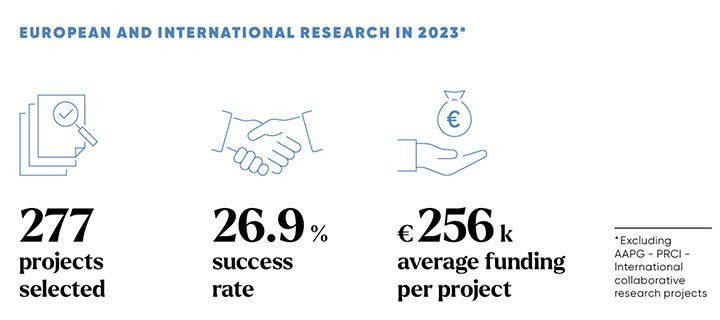Specific initiatives and funding instruments
Driving high-level international scientific cooperation
As part of its Action Plan, the ANR offers different funding instruments to promote cooperation between French teams and the best European and international teams, on specific and strategic research topics.
Between 2006 and 2023, nearly 4,000 transnational projects were co-funded by the ANR and its counterparts.
Approximately 15% of projects funded each year by the ANR are done so in partnership with European and international funders, representing a little less than 15% of the ANR’s dedicated call for proposals budget.
European and international research: key call for proposals figures for 2023 (excluding AAPG/PRCI)

Specific European and international calls for proposals
The ANR takes part in specific multilateral calls with its counterparts, notably in connection with European partnerships such as Cofunded Partnerships, ERA-NET Cofund, EJP, Article 185, and Joint Programming Initiatives (JPI), in order to support the participation of French teams in these calls. These initiatives complement European framework programme calls, and coordinate national and community initiatives. Some of them, such as JPIs and Partnerships, define a strategic agenda in their field in keeping with framework programme priorities, and details the joint initiatives to be conducted.
Over 80% of multilateral projects co-funded by the ANR involve European cooperation.
The ANR also establishes bilateral or multilateral strategic partnerships with funding organisations in various countries, which facilitate the co-funding of transnational research projects. They also strengthen cooperation between French teams and the best European and international teams, such as the Japan Science and Technology Agency (JST) via the Japanese CREST programme, the German Research Foundation (DFG) via the Franco-German Call for Proposals in Social Sciences and Humanities (FRAL), or partner countries of the Belmont Forum.
In connection with the Joint Committees on Science, Technology, and Innovation organised by MESR and high-level bilateral meetings, the ANR also offers dedicated calls for proposals for research areas or topics identified as being priorities by France and partner countries, such as quantum technology and artificial intelligence in cooperation with the CRSNG Canada, or nuclear energy in cooperation with the TA CR Czech Republic.
The International Collaborative Research Project (PRCI) instrument of the Generic Call for Proposals (AAPG) funds bilateral collaboration projects between at least one French scientific partner and a foreign partner, in connection with bilateral agreements between the ANR and its international counterparts. It strengthens bilateral collaboration on topics of mutual interest for partner countries, revolving around projects with strong synergy between teams, along with a complementary partnership.
View open and upcoming international calls for proposals
Encouraging the participation of French teams in European and international programmes
To encourage the French scientific community to seize the funding opportunities proposed by the European Union, the ANR contributes to the Action Plan To Improve French Participation in European Research and Innovation Funding Instruments (PAPFE) of the Ministry of Higher Education and Research.
To this end, it implemented multiple instruments supporting project coordinators in their efforts to develop international projects and networks (SRSEI and MRSEI), as well as their access to European Research Council calls for proposals (Springboard ERC and Access ERC). These instruments are the subject of dedicated calls for proposals.
- The Setting Up European or International Scientific Networks (MRSEI) instrument helps researchers from all disciplines to set up a scientific network in advance of submitting a project to a European (notably Horizon Europe) or international call.
- The Support for European and International Scientific Networks (SRSEI) provides resources to enhance the quality of applications (complete proposal or interviews), for the final stage of a targeted call, for scientists working in French laboratories who submitted, as a coordinator, research projects for collaborative European (Horizon Europe) or international calls.
- The Springboard ERC (T-ERC) instrument offers a new chance of success for young researchers from French public research organisations who, despite very good applications, did not receive funding as part of the European Research Council’s (ERC) Starting Grant and Consolidator Grant calls.
- Since 2022, the ANR has tested the Access ERC instrument, exclusively dedicated to the social sciences and humanities, to foster the career of young scientists by enabling them to prepare an ERC Starting Grant application under the best conditions.
Ensuring the international representation of French research
The ANR plays a major role, alongside international research actors, in the European and international planning of research funding, and represents France and its interests in multiple forums, including:
- European Joint Programming Initiatives (JPIs), which define a joint vision and coordinate the European implementation of research programmes on major societal challenges (climate, water resources, sustainable cities, etc.).
- Partnerships from the Horizon Europe Framework Programme, in which the European Union and member states commit, with private and public actors, to jointly support the development and implementation of research and innovation programme activities. As of 31 August 2024, the ANR is a member of 11 active co-funded Partnerships, and is helping prepare a number of additional ones.
- The Belmont Forum, a network of research funders for global environmental change research. The ANR actively participates in defining funding instruments and strategic priorities on a global level.
Learn more about the Belmont Forum and the ANR
The ANR also contributes to international scientific policy bodies, exchanging and defining joint principles of action:
- The Global Research Council (GRC), which includes over 60 heads of funding agencies across five continents, and conducts general reflections on scientific policy, research funding, and transnational cooperation.
- Science Europe, an association of European research funding agencies and research organizations, which promotes the collective interests of its members by helping implement the European Research Area (ERA). The ANR notably participates in working groups on collaboration policy, gender, open science, and impact analysis.
These initiatives:
- reinforce the national influence strategy and increase the visibility of French research across the globe,
- strengthen the ANR and improve its functioning through the exchange of best practices,
- coordinate joint initiatives, for instance in promoting open science.



